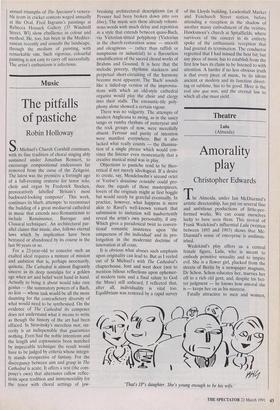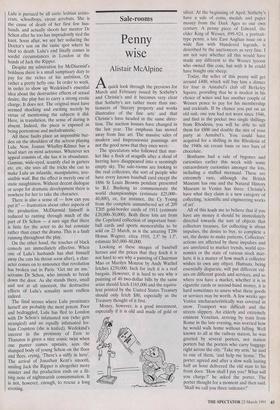Theatre
Lulu (Almeida)
Amorality play
Christopher Edwards
The Almeida, under Ian McDiarmid's artistic directorship, has put on several fine and ambitious productions of little-per- formed works. We can count ourselves lucky to have seen them. This revival of Frank Wedekind's influential Lulu (written between 1895 and 1903) shows that Mc- Diarmid's sense of enterprise is undimin- ished.
Wedekind's play offers us a central female figure, Lulu, who is meant to embody primitive sexuality and to inspire evil. She is a flower girl, plucked from the streets of Berlin by a newspaper magnate, Dr Schon. Schon educates her, marries her off to a rich old gent, and, despite his bet- ter judgment — he knows how amoral she is — keeps her on as his mistress.
Fatally attractive to men and women, Lulu is pursued by all sorts: lesbian aristo- crats, schoolboys, circus acrobats. She is the cause of death of her first few hus- bands, and actually shoots her mentor Dr Schon after he too has imprudently tied the knot. Soon after, we see her seducing the Doctor's son on the same spot where he bled to death. Lulu's end finally comes in sordid circumstances in London at the hands of Jack the Ripper.
Despite my admiration for McDiarmid's boldness there is a small sumptuary duty to pay for the riches of his ambition. Or rather a pretty hefty one. In order to work, in order to show up Wedekind's essential idea about the destructive effects of sexual desire, the play has to carry a strong erotic charge. It does not. The original must have seemed shocking and exciting merely by virtue of mentioning the subjects it did. Here, in translation, the sense of daring is absent. Indeed, the piece is exposed as being portentous and melodramatic.
All these faults place an impossible bur- den on the shoulders of the actress playing Lulu. Now, Joanne Whalley-Kilmer has a head start on most actresses. Whatever sex appeal consists of, she has it in abundance. Gamine, wide-eyed, scantily clad in garters etc, etc, she uses all the tricks she can to make Lulu an infantile, manipulative, irre- sistible waif. But the effect is merely one of static naughtiness. Without decent dialogue or scope for dramatic development there is nowhere for her to take the character.
There is also a sense of — how can you put it? — frustration about other aspects of the production. McDiarmid himself is reduced to ranting through much of the part of Dr Schon — a sure sign that there is little for the actor to do but constate rather than enact the drama. This is a fault running throughout the play. On the other hand, the touches of black comedy are immediately effective. When one of Lulu's husbands has shut himself away (he cuts his throat soon after), a char- acter comes on to announce that revolution has broken out in Paris. 'Get me an axe,' screams Dr Schon, who intends to break down the door. As she stands there, small and not at all innocent, the destructive effects of Lulu's sexuality seem endless indeed.
The final scenes where Lulu prostitutes herself are probably the most potent. Poor and bedraggled, Lulu has fled to London with Dr Schon's infatuated son (who gets strangled) and an equally infatuated les- bian Countess (she is knifed). Wedekind's interest in the proximity of Eros to Thanatos is given a nice comic twist when one punter comes upstairs, sees the slumped body of young Schon on the floor and flees, crying, 'There's a stiffy in here'. The arrival of Jonathan Kent's smooth, smiling Jack the Ripper is altogether more sinister and the production ends on a fit- ting note of nightmarish consummation. It is not, however, enough, to rescue a long evening.



























































 Previous page
Previous page